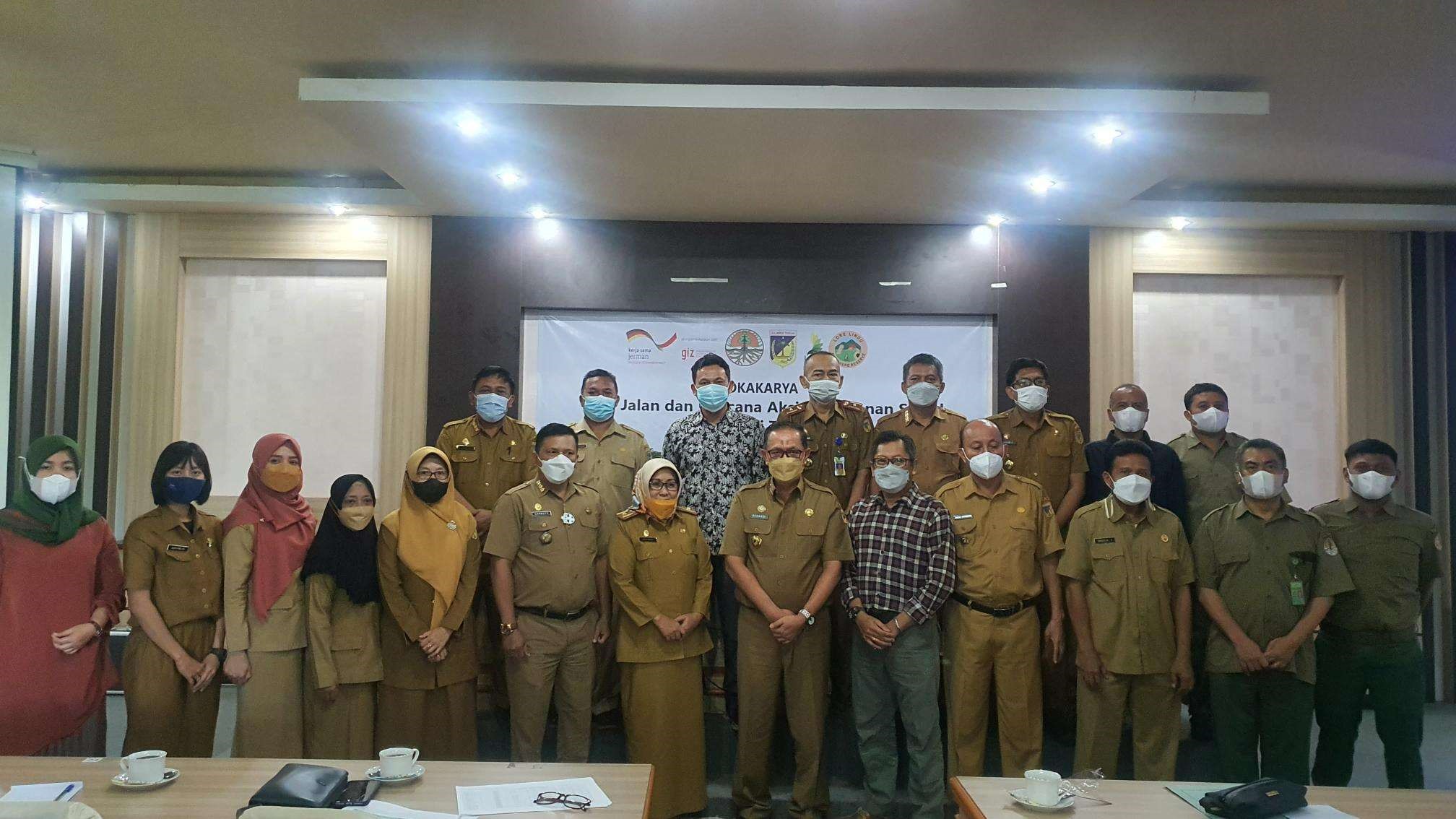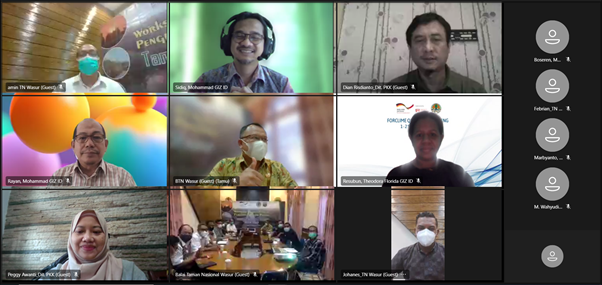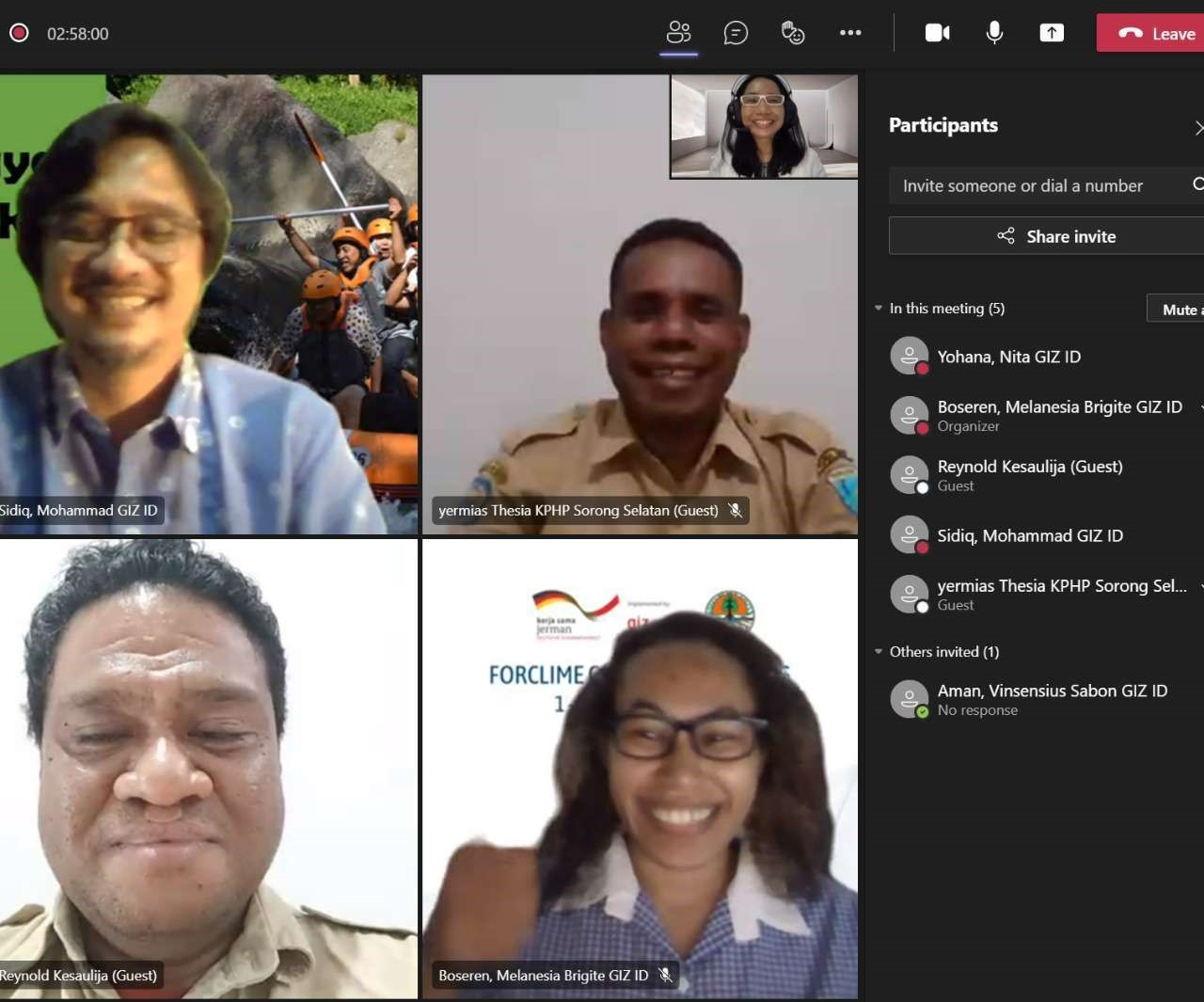FORCLIME
Forests and Climate Change ProgrammeTechnical Cooperation (TC Module)

Select your language

The Regional Medium-Term Development Plan (RPJMD) for Central Sulawesi Province 2021-2026 sets a total target of 100,000 ha, which includes 25,000 ha per year for social forestry. Based on this plan, social forestry is capable of supporting the various ecological functions in ways that are both economically and socially beneficial to surrounding communities through partnership schemes. With these goals in mind, the Central Sulawesi Provincial Forestry Service, supported by FORCLIME, held a coordination meeting on 5 October 2021 with the aim of developing an action plan capable of accelerating social forestry manage-ment. The meeting, opened by the Head of the Forestry Service, Dr.Nahardi, was attended by representa-tives from the Forest Management Unit Forum (KPH), the Social Forestry Working Group, Tadulako Univer-sity, the Regional Secretary of Central Sulawesi Province, the Cooperatives and UMK Office and the Trade and Industry Office.
In his speech, Dr. Nahardi affirmed that social forestry was closely related to poverty alleviation and thus supported the vision put forward under the Central Sulawesi Province Regional Development 2021-2026 programme, specifically, ‘Move Quickly Towards a More Prosperous and More Advanced Central Sulawesi’. Furthermore, Dr. Nahardi asserted that social forestry can:
1. Support the enhancement of productivity in relation to food crops, plantations, fisheries, livestock and other commodities.
2. Realize an increase in community welfare through the economic empowerment of the community and through the strengthening of institutions.
3. Encourage the formation and increase the productivity of leading regional sectors.
During the preparation of an action plan aimed at accelerating the management of social forestry, various issues will be taken into consideration, including: appropriate sources of funding, allocation of funds/capital resources, determination of superior/mainstream commodities in each region, types of ac-tivities to be developed, communities able to utilize forest resources sustainably.
The results of focused discussions regarding the preparation of an action plan aimed at accelerating the management of social forestry partly comprised a matrix that addressed the following topics:
a. Policy strengthening and stakeholder support.
b. Management that will preserve the function of forest areas that support community income.
c. Institutional management aimed at achieving the independence of Social Forestry Groups through community-based forest management.
In order to follow up on this meeting, the action plan document will be finalized after it has first been re-viewed by the Head of the Central Sulawesi Provincial Forestry Service. Preparations will then be made for its dissemination to all KPHs and regional organizations that relate to the social forestry programme.
For more information, please contact:
Fikty Aprilinayati, Adviser for Sustainable Forest Management and Biosphere Reserve Management
Ismet Khaeruddin, Senior Adviser for the Biodiversity Focal Point for the KFW Forest Program 3 and Provin-cial Coordinator for Central Sulawesi

As a follow-up to the evaluation workshop on the Long-Term Management Plan (RPJP) for Balai Taman Nasional (TN) Wasur for the 2013 - 2024 period, FORCLIME recently facilitated the RPJP evaluation working group to present its evaluation results to the Head of Balai TN Wasur and representatives of the Directorate of Conservation Areas at the Ministry of Environment and Forestry. The presentation was held on 9 September 2021 at the national park’s office in Merauke and was also conducted online.
The meeting was opened by the Head of Balai TN Wasur, Mr Yarman, before getting underway with a presentation of the evaluation results given by the RPJP evaluation working group. The evaluation results indicate the need to develop a new RPJP that will serve as a set of guidelines and offer directions to the management of Wasur National Park during the 2021 - 2030 period. During the discussion, FORCLIME representatives outlined the importance of addressing gender mainstreaming issues within the new RPJP document. Meanwhile, a representative from the Directorate of Conservation Areas, Mr. Dian Risdianto, expressed his appreciation for the evaluation process and stated his hope that the revision of the RPJP document could be completed within the next three months.
The Head of TN Wasur will form a Technical Working Group for the Development of RPJP TN Wasur for the 2021 - 2030 period and FORCLIME will continue to offer support in relation to the development of the new RPJP.
For more information, please contact:
Theodora F. Resubun, Advisor for Sustainable Forest Management and Coordinator for Papua Province
Mohammad Sidiq, Strategic Area Manager for Sustainable Forest Management and Coordinator for Papua and West Papua Provinces

With the goal of synergizing the implementation of their 2021 work programmes, FORCLIME and the Production Forest Management Unit (KPHP) for Sorong Selatan held an online coordination meeting on 7 September 2021. During the meeting, the head of the KPHP Sorong Selatan, Mr Reynold Kesaulija, addressed the forest management unit’s seven priority programmes for 2021, two of which are being supported by FORCLIME, specifically:
- Development of a database and information system that is integrated into the maintenance of KPHP Sorong Selatan’s spatial data;
- The redesign and revision of the Long Term Forest Management Plan (RPHJP), as well as GIS/spatial-data training for the forest management unit’s staff.
Support will be provided in relation to areas that are not available within KPHP Sorong Selatan and the West Papua Provincial Forestry Service and will take into account contributions of resources from each party.
In addition, the meeting also discussed the selection of FORCLIME 4.0 pilot villages. In this regard, the head of KPHP Sorong Selatan recommended three villages in Sawiat District, specifically: Sasnek Village, Wendi Village and Lembah Hijau Village (Persiapan Village). These villages are considered to have potential, including in terms of the production of sarang semut – a multi-efficacy herbal preparation indigenous to Papua (Myrmecodia pendans), as well as patchouli (Pogostemon cablin Benth), various fruits and environmental services/ecotourism. Currently, no assistance is being offered by working partners within these villages.
The Head of KPHP Sorong Selatan, Mr Reynold Kesaulija, expressed his appreciation for the level of communication that had been maintained so far. “This meeting has been very good, thanks to FORCLIME who are always available for us and, despite the ongoing pandemic, we have still been able to communicate virtually,” explained Mr Kesaulija.
For more information, please contact:
Nita Yohana, Adviser for Sustainable Forest Management and Coordinator for West Papua Province
Melanesia Brigite Boseren, Junior Adviser for Rural Livelihood, Forest Management and Conservation
Mohammad Sidiq, Strategic Area Manager for Sustainable Forest Management and Coordinator for Papua and West Papua Provinces
 |
Supported By: |
  |